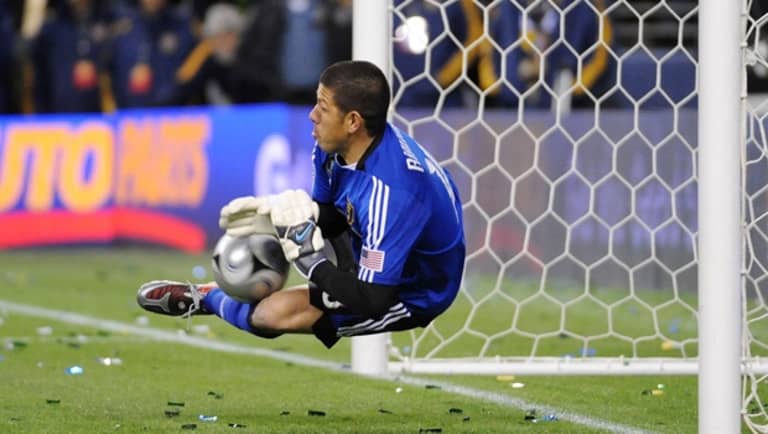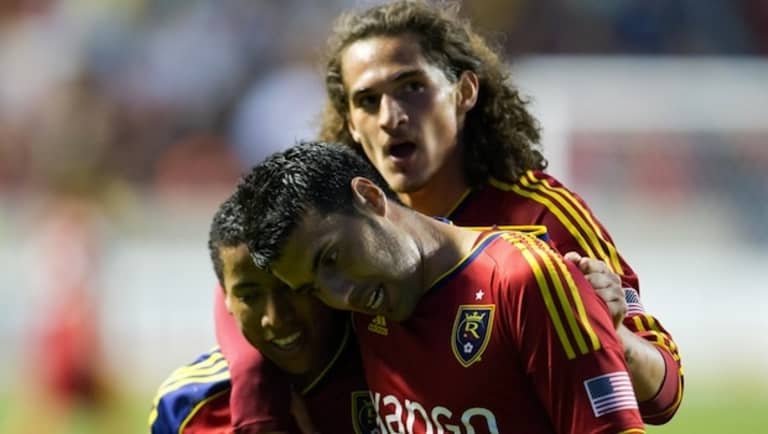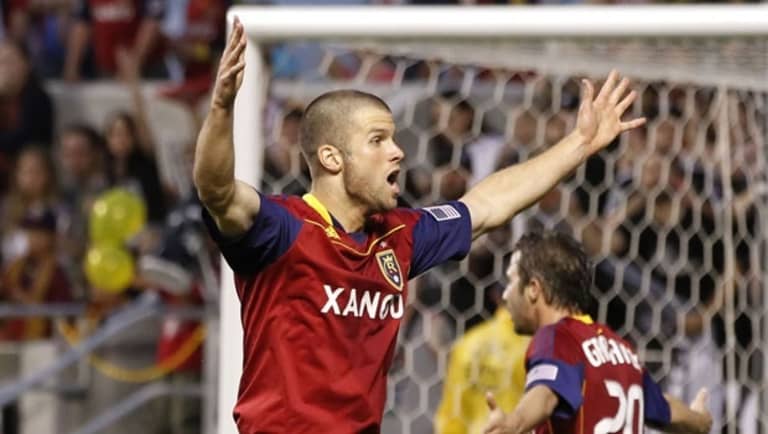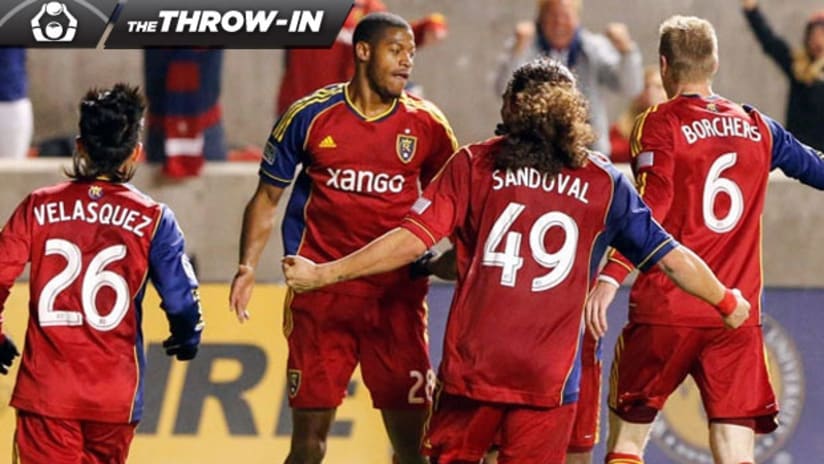KANSAS CITY, Mo. – Real Salt Lake shouldn’t be here.
By all reasoning and logic, a team that subtracts three starters from its core and replaces many of them with bench players and kids has no business being in MLS Cup.
A team that needs crucial goals from a rookie striker and a 22-year-old attacking midfielder shouldn’t have gotten this far. A side that was forced to play a 19-year-old center back for more than a third of the season couldn’t waltz into MLS Cup.
A team that relies on timely contributions from guys like Lovel Palmer, Abdoulie Mansally and Khari Stephenson, for heaven’s sake, should be miles from Saturday’s grand finale.
And yet here they are, “RSL 2.0” strolling into Sporting Park to face Sporting Kansas City (Saturday, 4 pm ET, ESPN, UniMas, TSN2/RDS in Canada). Bits and pieces remain from the near-dynasty of 2009-2012, but it’s still somewhat hard to wrap your head around how a relatively inexperienced group ousted the two-time defending champions and then pummeled the top finishers in the Western Conference to return to the championship game.
Even more stunning: Many of the veterans on this team think this version is better than the previous version. More capable than a team that won more regular-season games than all but one team from 2010-2012. Pluckier than the side that became the first MLS club to reach the finals of the CONCACAF Champions League, and came within inches of winning it back in 2011.
Here are five reasons why this incarnation of Real Salt Lake is better than its predecessors.

- They’re the underdogs once again
When RSL won their first championship, they did so in perhaps the biggest upset in MLS Cup history over the heavily favored LA Galaxy. That became their rallying cry over the next several years.
They were small market (Salt Lake is still the smallest metropolitan area in MLS). They had one Designated Player (Alvaro Saborio joined in 2010, and didn’t qualify as a DP until 2011). They prioritized “value” players instead of high-profile signings (for some, GM Garth Lagerwey is the Billy Beane of MLS).
But then they joined the elite of MLS thanks to their success on the field. RSL finished in second place twice and in third once in the West over the past three seasons. They stopped being underdogs. And they couldn’t handle being favorites.
They flopped in the Western Conference Semifinals in 2010 and 2012, and were ultimately stomped in the Western Championship at LA in 2011. They were the higher seed each time.
“If I have to make a criticism [about us],” center back Nat Borchers tells MLSsoccer.com, “when expectations around us are high, maybe we haven’t been able to come through.”
On Saturday, they’ll be the underdog in a big game really for the first time since their defining title. They’ll be playing away from Rio Tinto Stadium, where they’ve bagged some of their biggest results over the years. And they’re relishing it again.
“We always feel like the underdogs, even if we’re playing a team that’s the next-biggest market [in MLS],” says Borchers. “We can play that card because we’re away. We’ll play that card until the end.”
2. The core is still intact, and stronger
Yes, Jámison Olave, Will Johnson and Fabián Espíndola are gone. But despite the reboot, the beating heart of RSL is still intact: Nick Rimando and Kyle Beckerman have been there since 2009; Javier Morales, Chris Wingert and Tony Beltran all arrived in Utah in 2008 and all are wrapping up their sixth season together.
Throw in guys like Ned Grabavoy (who joined in 2009), Luis Gil (2010) and Robbie Findley (back after four seasons with RSL from 2007-10), and that’s half the gameday 18 whose experience dates back before the good times. And yet despite that…

- The chemistry is better
It’s hard to understand since the veterans have been through so many battles together. But in talking to the veterans, you begin to understand that the locker room is looser than it has been, and tighter at the same time.
According to Wingert, the veterans have been inspired by the attitudes of the younger, newer faces – many of whom have seen limited minutes this season.
“Cole Grossman, Devon Sandoval, John Stertzer, Aaron Maund, Olmes Garcia, Joao Plata – they’ve all brought some young, fun energy,” Wingert tells MLSsoccer.com. “They’re kind of a little ridiculous. I think the older guys are feeding off that a little bit.”
Most remarkable, he says, is that they cut the intensity of the locker room by joking and engaging with the mainstays and never sulk over their lack of playing time. Outside of Plata, who logged significant minutes in 2013, the rest of the above-mentioned sextet averaged less than 14 minutes per game this season.
“Those guys on most teams tend to be a little bit down,” Wingert explains. “I was like that [at the beginning of my career] in Colorado. It’s hard to be in great spirits every week when you’re not playing. Here, it’s a sign that we have a great spirit. Guys that aren’t playing feel like they’re a part of this.”
4. The legacy is incomplete
The analogy has been made before: If they don’t win another title, Real Salt Lake could become MLS’ version of the Atlanta Braves of the 1990s. Despite their dominance over the league, the Claret-and-Cobalt don’t have the silverware to show for it.
If it all ended tomorrow, RSL would be left with a lone MLS Cup title. And instead of being remembered as the class of MLS over a sustained period, playing pretty, possession-oriented soccer while developing national teamers past, present and future, they’ll be a one-hit wonder.
A title on Saturday would bookend that ’09 championship, putting an indelible stamp on this group’s legacy and a spot in the history books as a team that won two titles in five years.
“When we’re playing our best soccer, we’re the best team in the league,” says Borchers. “I think there’s definitely a sense that we haven’t achieved enough given the opportunities we've had.”
Lagerwey agrees 100 percent.
"It’s also been a source of frustration to a great many of us – from the front office to the coaching staff to the players – that we’ve won one title," he tells MLSsoccer.com. "We don’t have a lot to show for what’s been an incredible run.
"Is it life or death? No. But to have a bookend to that mantlepiece? That’d be nice."

- They’ve got a chip on their shoulder
Something changed for RSL when they lost October’s US Open Cup final to D.C. United – the worst team in league history – at Rio Tinto Stadium. It was another failure at home. It was a missed layup to achieve the quickest benchmark for this group to prove their success was no fluke.
They failed miserably. And it lit a fire under them. Wingert tells it best.
“I’ve thought about that a million times in my head,” he explains. “I thought we were going to win. And I thought, if we had won, the rest of season would be gravy. Maybe that was the difference. Maybe if we won, we would’ve been relaxed and we wouldn’t have beaten LA and then Portland.
“I’m not exactly sure if it was in everyone’s conscious mind, but everyone is a bit more on edge [now]. We kind of blew it with Open Cup, and I believe we all, in the back of our minds, knew we had to make up for that.”
Real Salt Lake shouldn’t be here at all. That’s what they want you think. And that’s why they’re more dangerous than ever.
Jonah Freedman is the managing editor of MLSsoccer.com














